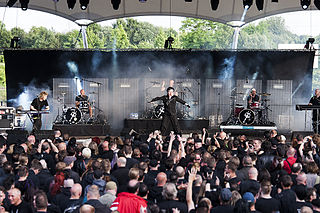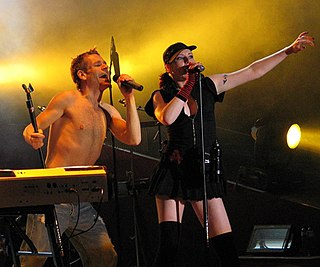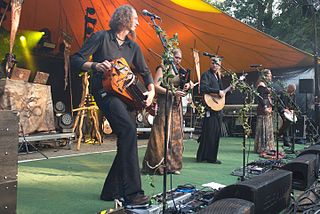Music style
The musical style of Die Streuner is focused in medieval music, and in particular in medieval tavern music. Their repertoire includes medieval drinking songs, old folk tunes and original, medieval- and Renaissance-like compositions. The lyrics of their songs (which include works from authors such as Friedrich Schiller, Heinrich Heine, François Villon and Erich Kaestner) are mostly in German, with some pieces in French and English.
The group was founded in 1994 by Miriam Petzold and Roland Kempen. Shortly after, Martin Seifert and Carsten Hickstein joined, while the arrival of Mathew Rouse gave the band its current quintet formation.
Among other features, they usually perform at both the Mittelalterlich Phantasie Spectaculum and the Kaltenberger Ritterturnier, where alias are used by all the five members.
Their albums have been released by the label Emmuty Records and produced by Roland Kempen. In 2009, an official fan club was created, named Wilden Gesellen.

Die Toten Hosen are a German punk rock band from Düsseldorf. The name is taken from the German slang idiom tote Hose, which means "nothing happening"; "boring".

Die Fantastischen Vier, often shortened to Fanta 4, is a German hip hop band from Stuttgart. The members are Michael Schmidt (Smudo), Andreas Rieke, Thomas Dürr, and Michi Beck. They were, together with Advanced Chemistry, one of the earlier German-language rap groups.

Slime, a German punk rock band founded in Hamburg in 1979, became a defining band in the 1980s German punk scene, and is the most widely recognized example of the musical style Deutschpunk.

Project Pitchfork are a German dark wave and electronic music group from Hamburg, Germany.

Subway to Sally is a German folk metal band founded in Potsdam in the early 1990s. Their music has clear folk and medieval influences, later also adding gothic and metal elements. With their continuous inclusion of oriental sounds and elements of classical music and the use of instruments seldom seen in metal bands such as bagpipes, shawm, violin, hurdy-gurdy and lute, Subway to Sally has acquired the label of medieval metal. The band has released 12 studio albums, two live albums, and two live DVDs. Their fame is centered mainly in the German-speaking countries, having played only a handful of concerts outside of that area.

Diamond Rio is an American country music band. The band was founded in 1982 as an attraction for the Opryland USA theme park in Nashville, Tennessee, and was originally known as the Grizzly River Boys, then the Tennessee River Boys. It was founded by Matt Davenport, Danny Gregg, and Ty Herndon, the last of whom became a solo artist in the mid-1990s. After undergoing several membership changes in its initial years, the band consisted of the same six members from 1989 to 2022: Marty Roe, Gene Johnson, Jimmy Olander, Brian Prout (drums), Dan Truman (keyboards), and Dana Williams. After Prout and Johnson both departed in 2022, they were replaced by Micah Schweinsberg and Carson McKee respectively.

Die Skeptiker is a German punk band founded in 1986 in East Berlin. The band is one of the most significant punk bands in East Germany, and belongs to the group of punk bands known as die anderen Bands, along with Sandow, Die Art, Feeling B, Tausend Tonnen Obst, and Die Firma. Although they performed songs critical of the Wall, they were able to gain an official license to perform live shows (Spielerlaubnis) by the East German state by writing intelligent lyrics with criticism between the lines. They were also able to establish themselves in the broader German music scene after German reunification.

Tilmann Otto, better known by his stage name Gentleman, is a German reggae musician.

Rosenstolz was a German pop duo from Berlin that was active between 1991 and 2012 and had chart hits in Germany, Austria and Switzerland. The duo consisted of singer AnNa R. and musician Peter Plate, who occasionally provided vocals. Rosenstolz achieved major chart success after the nineties, with five studio albums going to No. 1 in the German albums chart. Although the duo split up to pursue separate music careers, they left open the possibility of a future reunion.

Omnia is a self-described "neoceltic pagan folk" band based in the Netherlands, whose members over the years have had Irish, Dutch, Cornish, Belgian, Indonesian, and Persian backgrounds. Their music takes the form of various cultural routes, from places such as Ireland, England, Cornwall, and Iran. The name of the band is a Latin word that means "everything".
German punk includes a body of music and a subculture that have evolved since punk rock became popular in Germany in the 1970s. Within the subculture of punk in Germany, a style of music called Deutschpunk was developed; this style of music has developed distinctly from hardcore punk, and includes lyrics in German as well as a fast tempo. In the punk scene in Germany, some bands play music in the Deutschpunk style, while other German punk bands pursue various other styles of punk music.

Faun is a German band that was formed in 1998 and plays pagan folk, darkwave, and medieval music. The originality of their music style is that it falls back to "old" instruments, and the singing is always the center of attention. The vocals are performed in a variety of languages, including German, English, Latin, Greek, and Scandinavian languages. Their instruments include Celtic harp, Swedish nyckelharpa, hurdy-gurdy, bagpipes, cittern, flutes, and many others.
Avulsed is a Spanish death metal band, formed in August 1991 in Madrid by Dave Rotten.

Extremschrammeln are an Austrian folk music band, led by guitarist and singer Roland Neuwirth. The group enhance the traditional Viennese folk music Schrammelmusik with satirical lyrics, as well as jazz, blues, rock, and 20th-century classical music influences. They perform original songs in German, Viennese, and English.

Schandmaul is a German medieval folk rock band from the Munich area.
Medieval folk rock, medieval rock or medieval folk is a musical subgenre that emerged in the early 1970s in England and Germany which combined elements of early music with rock music. It grew out of the British folk rock and progressive folk movements of the late 1960s. Despite the name, the term was used indiscriminately to categorise performers who incorporated elements of medieval, renaissance and baroque music into their work and sometimes to describe groups who used few, or no, electric instruments. This subgenre reached its height towards the middle of the 1970s when it achieved some mainstream success in Britain, but within a few years most groups had either disbanded, or were absorbed into the wider movements of progressive folk and progressive rock. Nevertheless, the genre had a considerable impact within progressive rock where early music, and medievalism in general, was a major influence and through that in the development of heavy metal. More recently medieval folk rock has revived in popularity along with other forms of medieval inspired music such as Dark Wave orientated neo-Medieval music and medieval metal.

Schelmish was a German Mittelalter rock band from the city of Bonn. The band originally formed in 1999 for a birthday celebration for band member Des Demonia's mother. The language of their songs varies between German, English, Latin, French and several old languages. The band split-up in December 2012; a group of member founded the electro folk rock band InVictus.

Obscurity is a German extreme metal band with strong Viking metal influences hailing from Velbert, a city in the Bergisches Land in North Rhine-Westphalia. They are one of the early German death, black, Viking, and pagan metal bands.

Formed in 2001, Die Irrlichter is a German band performing medieval folk and fantasy music at concerts, festivals, renaissance fairs, medieval banquets, and similar events in Germany and other European countries.

Oomph! is a German Neue Deutsche Härte band from Wolfsburg, formed in 1989. The band pioneered the Neue Deutsche Härte movement. Their work contains lyrics in both English and German, with a shift towards German exclusively on recent albums.

















